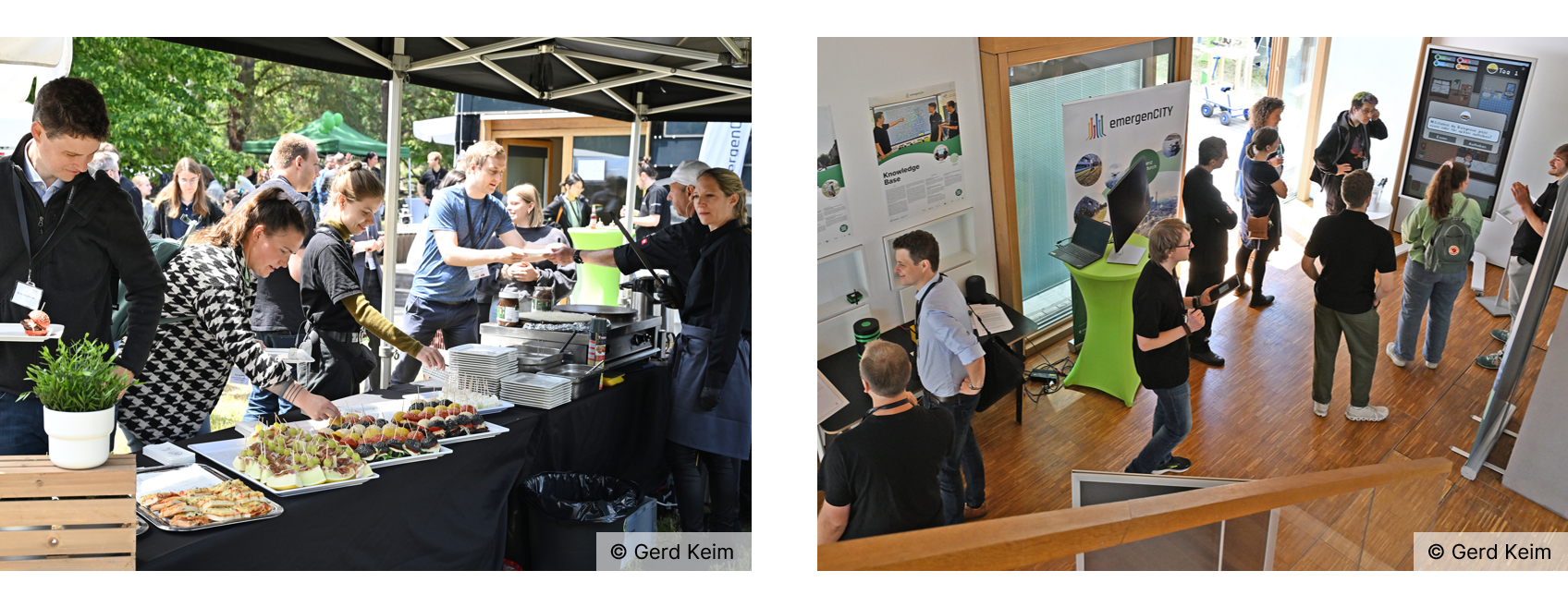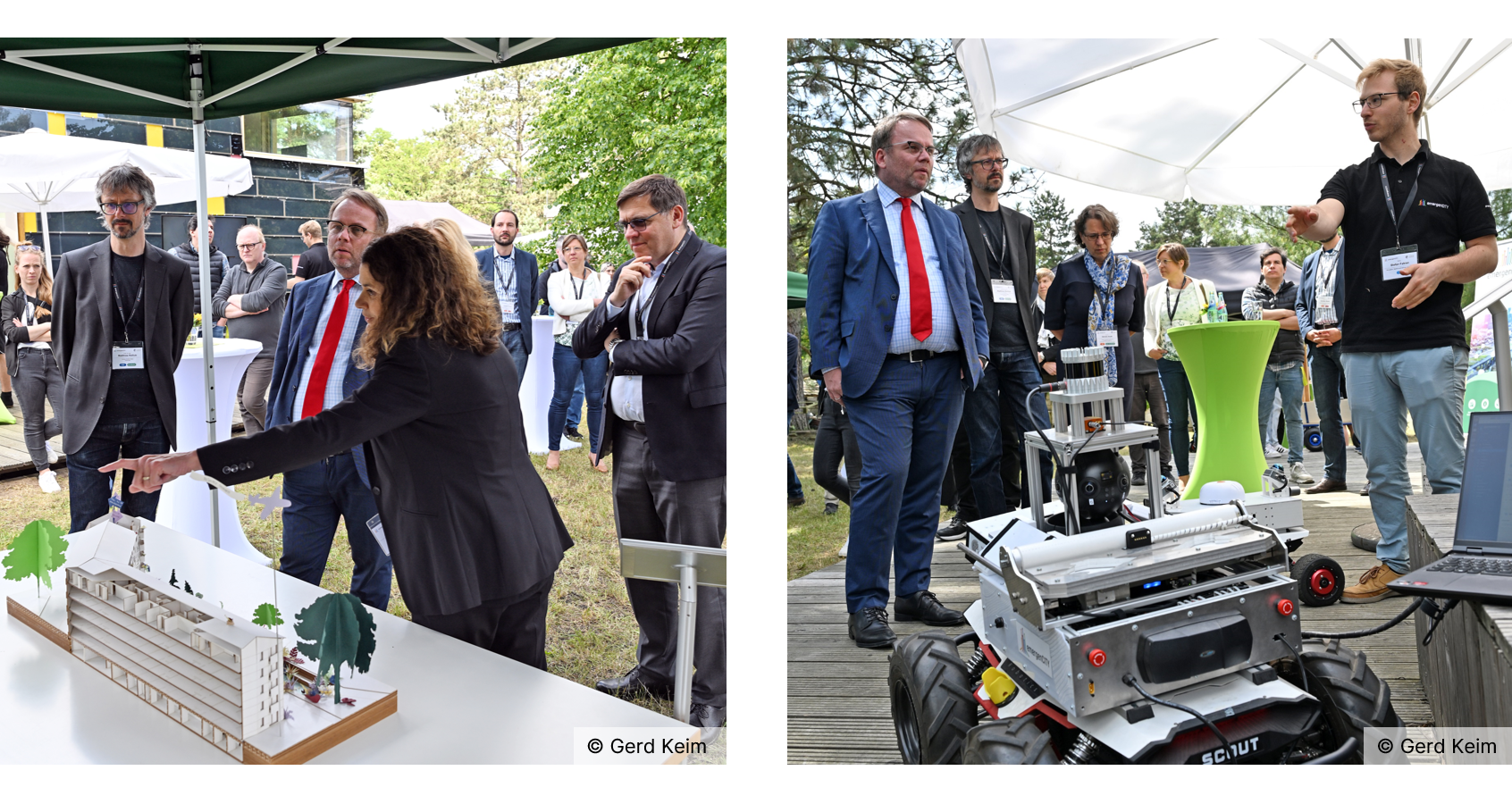Timon Gremmels was not the only one impressed by emergenCITY’s research at the Open eHUB Day.

Lots of praise for future-oriented research projects, lively exchange in a relaxed atmosphere, many interested guests, excellent weather and delicious food – the emergenCITY Open eHUB Day on the Lichtwiese campus of the TU Darmstadt was a successful event all around.
The focus was on the eHUB Living Lab with its futuristic facade, which was presented to the public for the first time on this day. The energy-autonomous smart home is a prototype of how emergency power supplies for hospitals and basic communications could be maintained in the future using electricity from private photovoltaic systems. The helpful functions of the eHUB are also a prime example of emergenCITY research, whose primary goal is to ensure the operability of cities with digitally networked infrastructures in all kinds of crises.
Given the increasing importance of resilience in the face of growing environmental disasters and threats from war, Hesse’s Minister of Science, Timon Gremmels, did not miss the opportunity to visit the informative open house day at Lichtwiese. Gremmels expressed his pride in the research results of TU Darmstadt and its partners. “This is well-invested state money,” the minister emphasized, referring to the approximately 22 million euros that the state of Hesse has provided to the researchers since 2020. He emphasized that the LOEWE Center emergenCITY will make a significant contribution to disaster prevention. A increasingly vulnerable society must be protected, and digitalization should be seen as an opportunity to create the necessary digital resilience, something TU Darmstadt recognized and acted upon long ago, praised the minister, calling it “one of the very important universities in Hesse.”
After being welcomed by TU Vice-President Peter Pelz, Scientific Coordinator Matthias Hollick and Managing Director Katharina Kleinschnitger, Timon Gremmels showed great interest in the various missions of emergenCITY research. In a good mood, he immediately played a round of “Krisopolis”, a newly developed serious game that conveys information about crisis prevention in a playful way. Players must navigate their avatars through various crisis scenarios. Another new game presented at the eHUB, “eHUB CITY: Blackout,” aims in the same direction, where resources must be skillfully managed while maintaining social relationships. In addition to such playful preparations for serious situations, researchers at the LOEWE Center have developed a number of practical tools that are ready for use in real crises. For example, when power outages during the recent floods in southern Germany made it impossible to locate injured people due to the lack of a communication network, the fleet of drones created by emergenCITY can establish an emergency network and, in conjunction with rescue robots developed in the project, search for missing people.
In addition to such playful preparations for serious situations, researchers at the LOEWE Center have developed a number of practical tools that are ready for use in real crises. For example, when power outages during the recent floods in southern Germany made it impossible to locate injured people due to the lack of a communication network, the fleet of drones created by emergenCITY can establish an emergency network and, in conjunction with rescue robots developed in the project, search for missing people.
While the drones were vividly presented at the eHUB Day, but did not take off, the rescue robots whizzed around between the trees on the Lichtwiese and had a large audience. Other technologies currently being tested in Darmstadt were also presented, such as the “Litfaßsäule 4.0”, an autonomous communication medium for crisis situations, or sensor boxes that can also be used for communication purposes, but primarily to help strengthen the city’s climate resilience with their measurement data. About 40 of these boxes will be installed on lampposts in the Lichtenbergblock in Darmstadt’s Martinsviertel.
The fact that emergenCITY addresses crisis scenarios and solutions not only from a technical perspective, but also aims to involve citizens, was emphasized during the open house day by a short presentation by political scientist Michèle Knodt on local democracy and participation in the digital city.
Joachim Schulze, Michaela Leštáková, Frank Hessel, Alejandro Sanchez Guinea, Stefan Fabian and Bastian Blössl also gave detailed presentations on the eHUB, Knowledge Base, Digital Heinerblock, Smart Digital Situation Control Center and Aerial Crisis Networks missions.
Minister Gremmels was visibly impressed by the application-ready research results. The importance of this research for society cannot be emphasized enough, he said.
(This article was originally published on the emergenCITY website and you can read the original article here.)
